How Gillon McLachlan saved footy from coronavirus pandemic while working 18-hour days
Footy will return next week 81 days after the season was shut down. AFL chief Gillon McLachlan details how quickly the landscape changed heading into Round 1 and when he finally decided they would play.
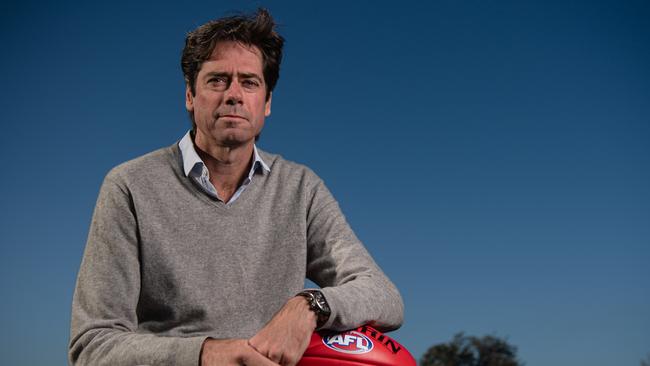
So, what does the man who worked 18 hours a day for almost 70 days do to keep his sanity?
Grow a beard, grow the hair, skip sleep, don the runners and go for a run.
That has been Gillon McLachlan in isolation.
The AFL boss’ days would start at close to 6am and end after midnight, sometimes close to 2am.
Sometimes he was out of bed at 3am, because there was always something to attend to or someone to be informed about.
His life was basically phone calls and conference meetings, proposals and crisis management. And strict isolation.
Sleep? Well, you can do that when you’re dead.
“It was a weird time,” he says.
“It was just work, Webex meetings and going for a run once a day.”
That run was for 30 minutes as the sun dipped in the east.
The route was the same every day: out the front door, turn right and a loop around Prahran.
Get your footy fix on KAYO ahead of live matches returning soon. Watch classic battles from the 60s to today, docos, news and more. New to Kayo? Get your 14-day free trial & start streaming instantly >
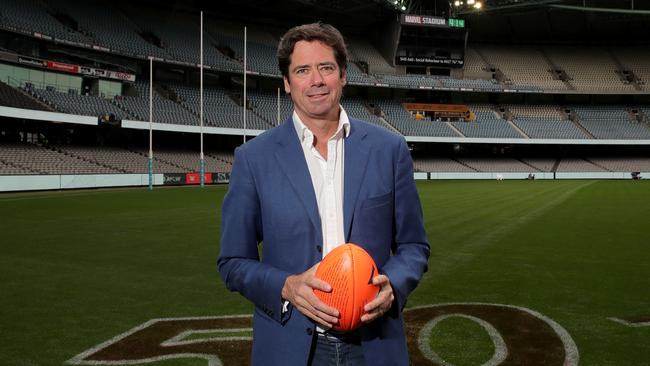
“I tried to blow a few cobwebs out,” he said.
“That's been a silver lining, me getting fit again.”
What it allowed McLachlan to do was momentarily park bureaucracy — the prime minster’s office, the state government heads, the medical experts, the coaches, the CEOs, the players association — and get back to grassroots.
“I actually had some great experiences,” he says.
“I remember a woman on a lollipop sign wanting to come and almost give me a hug.
“I said, ‘you can’t do that’, we sort of elbow pumped and I sort of felt a bit rude.
“There were different people. That run, or that walk, you’d have people telling you how important football was to them.
“And some people, at times, said we shouldn’t have played Round 1, but most were desperate to get footy back.
“It was a time when there was contact with the average supporter which reminded you how important the game was to everyone.”
SUBSCRIBE TO THE SACKED PODCAST HERE
And the beard and hair?
It was while wife Laura and the kids were at their holiday house in the Otways and McLachlan was at home for a month by himself.
“You couldn't get a hair cut, I didn't know how to get a hair cut, remember that time?” he said.
“The beard was a bit of living on your own, but of shtick, I don't think I was only guy who grew a beard during that time. It was reheated spag bog and uber eats every day and working, and the beard was just part of it.”
His vices were punting on Saturday on the horses — “I understand all the bookmakers are having a good time,” he quipped — and two beers most nights.
“I was quite disciplined through that time … and I'm less disciplined at that moment.”
IT'S HAPPENING
For a long time, McLachlan had little occasion to engage in banter.
When the coronavirus throttled football in March, it was initially thought it could throttle it to death, so much so McLachlan had to assure the clubs and their fans that “18 teams were coming in and 18 clubs would come out”.
“I don’t think I was scared, but I was certainly aware the situation got very real very quickly,” he said.
Such was the relentless march of the virus across the world, in the space of two weeks McLachlan went from being bullish about the season ahead to closing it down at halftime of the Brisbane-Hawthorn game on the Sunday of Round 1.
A major day was Tuesday, March 10 — nine days before the first match of the season.
There was an AFL commission meeting, a meeting of club presidents and the season launch all on the same day.
“I remember getting a call from Martin Pakula (Sports Minister) between the Commission meeting in the morning and the presidents meeting around lunch time, where the ban on mass gatherings, or the decisions the Andrews government were going to make, were flagged to me ahead of time,” he said.
“It meant the meetings were hijacked, and it floated into the coaches meeting the next day.
“Six days later, we've gone to a 17-round season and nine days after we're going ahead without crowds.”
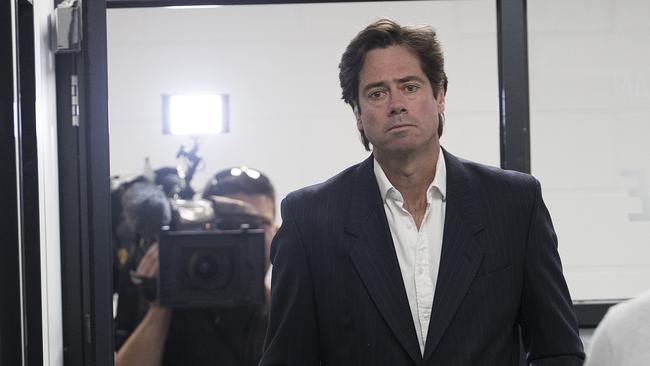
The Wednesday, the day before the Richmond-Carlton season-opener, was a hellfire.
Would they play or would they not?
McLachlan made the call: they would play.
The decision was made in his office with media advisers Brian Walsh and Jay Allen in attendance
The pair had prepared two media statements. A: We are on. B: We are off.
McLachlan was asked to convince them why the season should start when most of the rest of society was preparing for shut down.
McLachlan spoke passionately about the importance of football, Allen took notes, and statement C was formulated.
“My experience is when there's a big decision in front of you, you don't contemplate the enormity until afterwards,” McLachlan said.
“There were views either way. I felt comfortable. That decision was late, it didn't get made until 10 minutes before I walked out to do the press conference.”
It was one of the most significant decision in his time as chief executive.
“I was aware that decision was going to come down to me, that responsibility rested with me and the Commission,” he said.
“My role is make a call and bring people with you.”
READ MORE:
AFL can’t guarantee new TV deal before season restart but confident it will eventually get done
VFL clubs believe they might be extinct under new state league, AFL’s best VFL recruits since 2000
Popular commentator Dennis Cometti inducted into the Australian football Hall of Fame
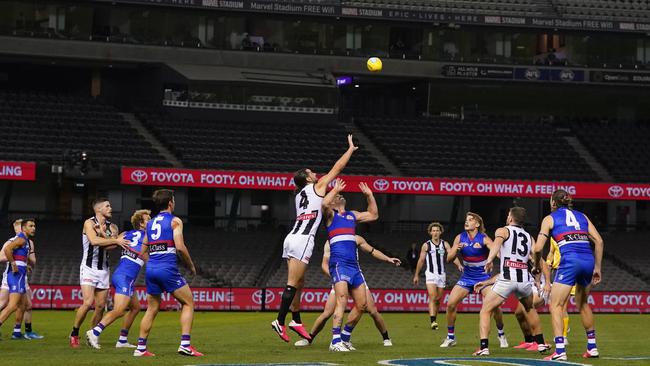
CARE AND CLINICAL
Fear gripped the footy community.
After the season cancellation, clubs were asked to prepare financial models if footy was off for the year.
The result was, in a worst-case scenario, that not all clubs would survive.
“Clearly, when you’ve got a billion dollar cost based on no revenue guaranteed, if we didn’t have a season there is dramatic consequences,” McLachlan said.
From the start, McLachlan knew that for him to lead, he had to learn.
He studied the coronavirus, watched and read about the spread and impact of the virus overseas and was in constant talks with health minister Greg Hunt, Victoria’s chief health officer Dr Brett Sutton and Sports Minister Martin Pakula.
“If you go through all the decisions, to reduce the season, then to play and then to stop playing, all of them are informed by having an assessment of where this pandemic was going to take us, what the implications were, and what the decision were likely to be from health officials and governments and how it was going to impact our community,” he said.
“I got a bit obsessed with it all. Not obsessed but I was certainly, you know, flattening the curve, social distancing, protocols, resilient measures, what you could do, what was the government decision likely to be … we all had to best informed to work out how, under all the scenarios, we could manage our responsibility to health and well being with also trying to get a season away and keep the game going.”
McLachlan became Captain of Social Distancing after the AFL office closed down.
No one from headquarters saw him for six weeks and no visitors were allowed to his house.
“You’ve got be leading on that,” he said.
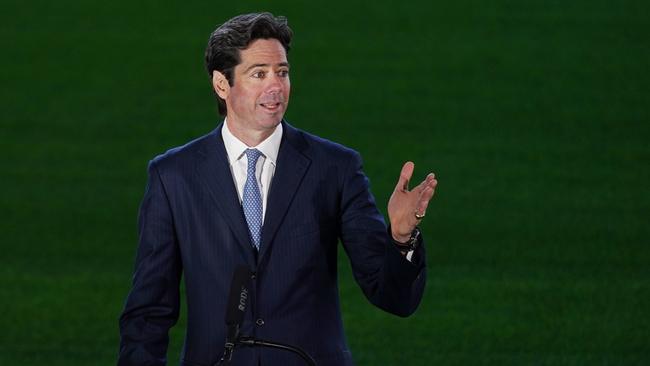
From home, McLachlan plotted the return to football.
What we do know is his days and weeks revolved around meetings with federal and state leaders, health minsters and experts, the broadcasters and two meetings a week with club chief executives, meetings with coaches, presidents, his war cabinet and his executive.
To that, add media, add individual players and add the players association.
Throughout, McLachlan’s mandate was to make decisions — which were harrowing for many — in the best interests of the code.
It meant telling clubs to stand down staff and standing down his own staff, as much as 80 per cent.
Clubs were far from happy.
They believed the initial cuts were too drastic and the recent cuts, of having only 26 people in your football department, were too narrow.
One time, McLachlan had about 800 staff across the nation on a Webex call, during which he had to deliver heartbreaking news.
“That was clearly as tough as any decision during the period,” he said.
“Your people are everything and you're acutely aware how committed they are to the game, acutely aware they've got their own obligations and families, it was incredibly tough. In my experience, you have to be honest and transparent and as direct as you can, be as early as you can and, of course, with empathy and understanding.”
He was caring and clinical.
“Everything with people is always tough, but my obligation to the organisation, which includes the people, is to make the right decisions for the organisation. There's no easy way through that other than to be as clear as you can about what you're doing it and having that empathy.”
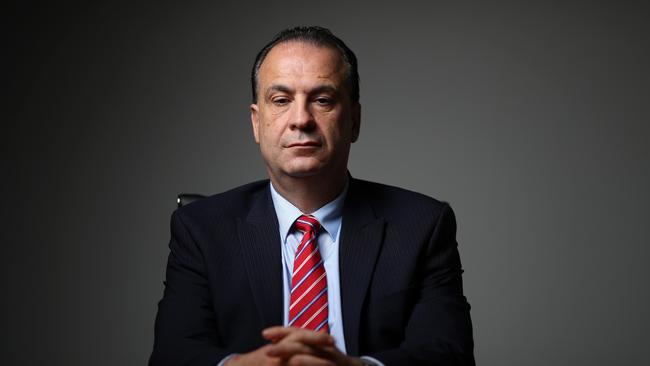
People have argued the return of AFL is two weeks too late — that the Peter V’landys-inspired NRL has been given a lengthy headstart with outstanding TV ratings to show for it.
Comments were made from within.
Even Richmond coach Damien Hardwick applauded the NRL’s “aspirational-type leadership”, saying he wished the AFL had followed V’landys’ lead and set a return date at the height of the coronavirus crisis.
The NRL chairman himself said he was amused at the AFL’s back-and-forth on the need for isolation bubbles.
“At times I’ve looked at them (the AFL) and had a giggle,” he told the Sydney Morning Herald.
So how would McLachlan describe V’landys, who has, with his supporters, thrown rocks at the AFL?
“Determined,” he said.
“We keep an eye on what everyone’s doing, but we focus on what we’re doing. I think that’s all overblown.”
HUBS AND HURDLES
With one finish line in sight – the game returning next Thursday – McLachlan is still under immense pressure to get the broadcasting deal done.
The Herald Sun revealed on Thursday night the TV rights deal with Foxtel and Channel 7 was in limbo.
Failure to get it done would threaten the financial revival of the code.
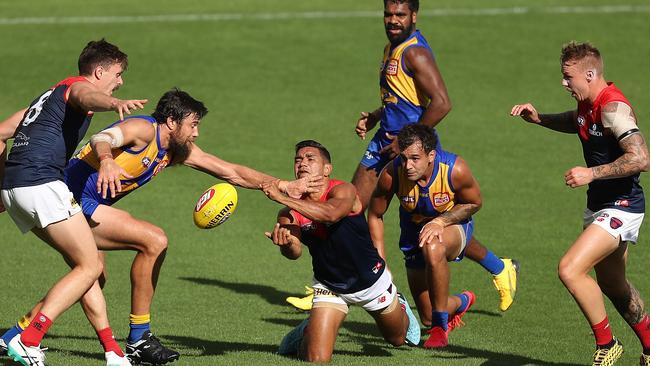
The networks are pushing for a reduction of about $150 million on their 2020 payments because the season has been compromised by the COVID-19 crisis.
McLachlan’s negotiations are being closely watched from all quarters — because the deal is crucial in determining cash distributions to all 18 clubs
Spotfires were everywhere and some threatened to become bushfires.
The pay dispute with the players – their salaries were cut by 50 per cent – was testy but ultimately resolved.
“It can get lumpy, but the players have absolutely done their bit to get us through this,” he said.
The hub plans hijacked the agenda and eventually came to the boil when the players were presented with a worse-case scenario by players boss Paul Marsh, via the AFL, where they could be live hubs for 20 weeks.
The AFL and McLachlan rarely, if ever, say they got it wrong. This was close.
“I'm sure the communication through that couple of days – I called it a glitch – it could've been better,” he said.
“'There was so much going on. Of course, we're going to get a few wrong, but broadly communications has been a strength.”
Then there were the “incidents”.
There was Western Bulldog Lachie Hunter who, drunk, crashed his car into four cars.
“Young men make mistakes but I've really got an issue with drink driving, I don't like it,” McLachlan said.
“I know the club owned it and he owned it.”
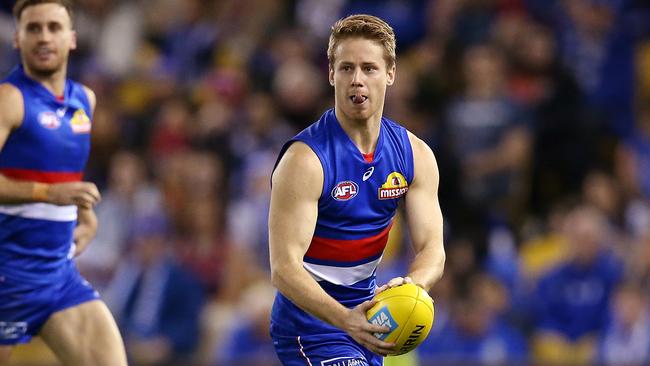
There was Geelong's Jack Steven who was stabbed on a Saturday night in Melbourne.
“Obviously, there was concern for his health and that's the priority for everyone to make sure the player and everyone around them is OK. Then afterwards you get to the bottom of it.”
There was the Adelaide players who defied social distancing rules by training in a group in the Barossa Valley, a calamity which threatened dealings between the AFL and the flip-flopping South Australian government.
How did you feel about that? “Umm, yeah, I was agitated.”
Which means you were filthy angry?
“Agitated.”
“My comment on that is, I was living and breathing these protocols every day, but you know we had some work to do so they really understood how serious we have to take them in both protecting them and the community and also to deliver on the commitments we were making to governments.”
He spoke to Crows chief executive Andrew Fagan.
Agitated again? “Aahh yeah … no, I was all right.”
“I think there is clearly lumps and bumps everywhere, but generally you've seen the best of our industry,” he said.
COMMUNITY FOOTBALL
The AFL has been accused of forgetting community football. McLachlan disagrees.
“Community football is equally important as the elite, they serve and nurture each other, and this instance the elites have been more prominent but it's no less important,” he said.
“Clubs are the heart of every community and it's coming back together, that's what it is, we're getting our communities back.”
Last Sunday, he witnessed it first hand.
He took his boy and two girls to training for the first time since shutdown.
“Just to see the joy of being back playing footy, they loved it. That's a real joy and that's what people all over the country will be getting in coming weeks. The kids were thrilled to see each other and thrilled to be kicking the footy. It's the heart of what being a kid is about.”
Martin Pakula: The who saved footy
What did I see that I didn’t know about Gill? Interesting question. Early on I could really tell he was feeling it and I told people one of the blokes with the hardest jobs in the country was Gill. He’s got 18 clubs to worry about, 800 players, broadcasters, six state government, the Commonwealth Government, all those chief health officers, and every footy fan was relying on him to walk that line and he did it.
At no stage was there any sense of entitlement.
He wore the pressure and the potential consequences of it and he never lost his rag, certainly not in any conversations with me.
I thought he was exceptionally impressive and has been all the way through.
I would’ve had two dozen conversations with him through this period and I remember one conversation in particular.
We had a heart-to-heart about how this had changed legacies. I said to him, ‘you’ve got to get your head around the fact you had this bright, shiny, beautiful thing which was in good nick and you were the inheritor and the passer-on of that. That’s not your legacy any more. Your legacy now is the guy who saved football.’
That’s the Gillon McLachlan story now, you have save this great sport and it’s a total mindset change about what you were put here to do.
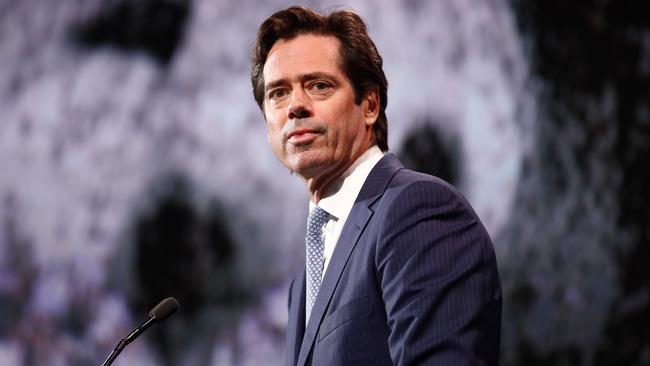
We were both really reflective. Gillon would’ve had his dark night on the soul, we all have, and that realisation we were both coming to, that it’s no longer about this pristine environment, it was about the saving the sport. Once you get into the head space that’s your job now, it’s very different.
Gill’s not a big noter. This thing about rugby league boss Peter V’landys, you know, I knocked the doors down and blazed the trial … I don’t think Gill gives two hoots about that.
It’s not about being recognised as the person who delivered the outcome, he just wants the football season. He’s not remotely fussed about who gets the plaudits.
Greg Swann: He got s--t done
He’s done power of work to get this done.
I know they keep pumping up Peter V’landys, and I know we are two weeks behind, but he’s done of power of work. It’s gone from death and despair to a bit of hope.
I think he’s been running on fumes.
There were a couple of Webex meetings where you thought he hadn’t slept for a week. He hadn’t had a hair cut, the growth was getting away from him. He reckoned he didn’t have time to go out.
The worst 48 hours was the game stopping and then all the stand-downs. He put the facts as they were to us, here’s our advice, here’s the change in rules. Then there were questions: Will we get back? He said we don’t know.
The CEOs had two meetings with Gill a week. He was always availability. His demeanour changed over time, he became more positive as the weeks went on.
He’s always been strong on us being responsible and being over and above what everyone else was doing so we could get back to play.
Personally, I think his leadership has been outstanding. He’s covered off everything. He’s across the medical protocols, the return to play, he meet with coaches, CEOs, footy managers presidents, broadcasters, all state governments, health ministers, medical officers, whoever needed to be spoke to … he ran the show.
His legacy is the survival of the game without trying to make it too dramatic.
The other thing, and this needs to emphasised, up here they want to build a statue of V’landys and he’s done a good job so don’t get me wrong, but our bloke has gone about it in different way. The same things have been happening, he hasn’t been as public but he’s just got s--t done.
